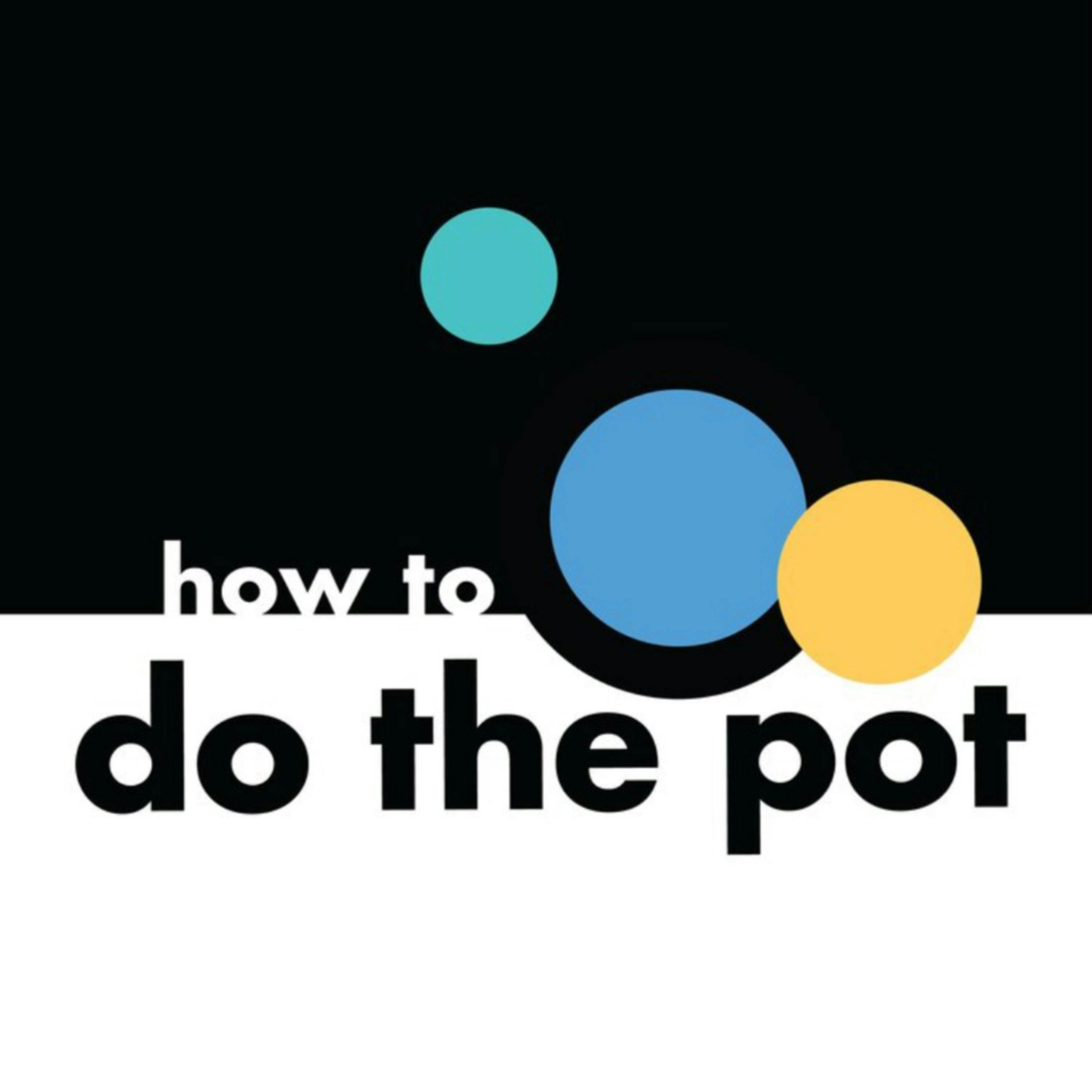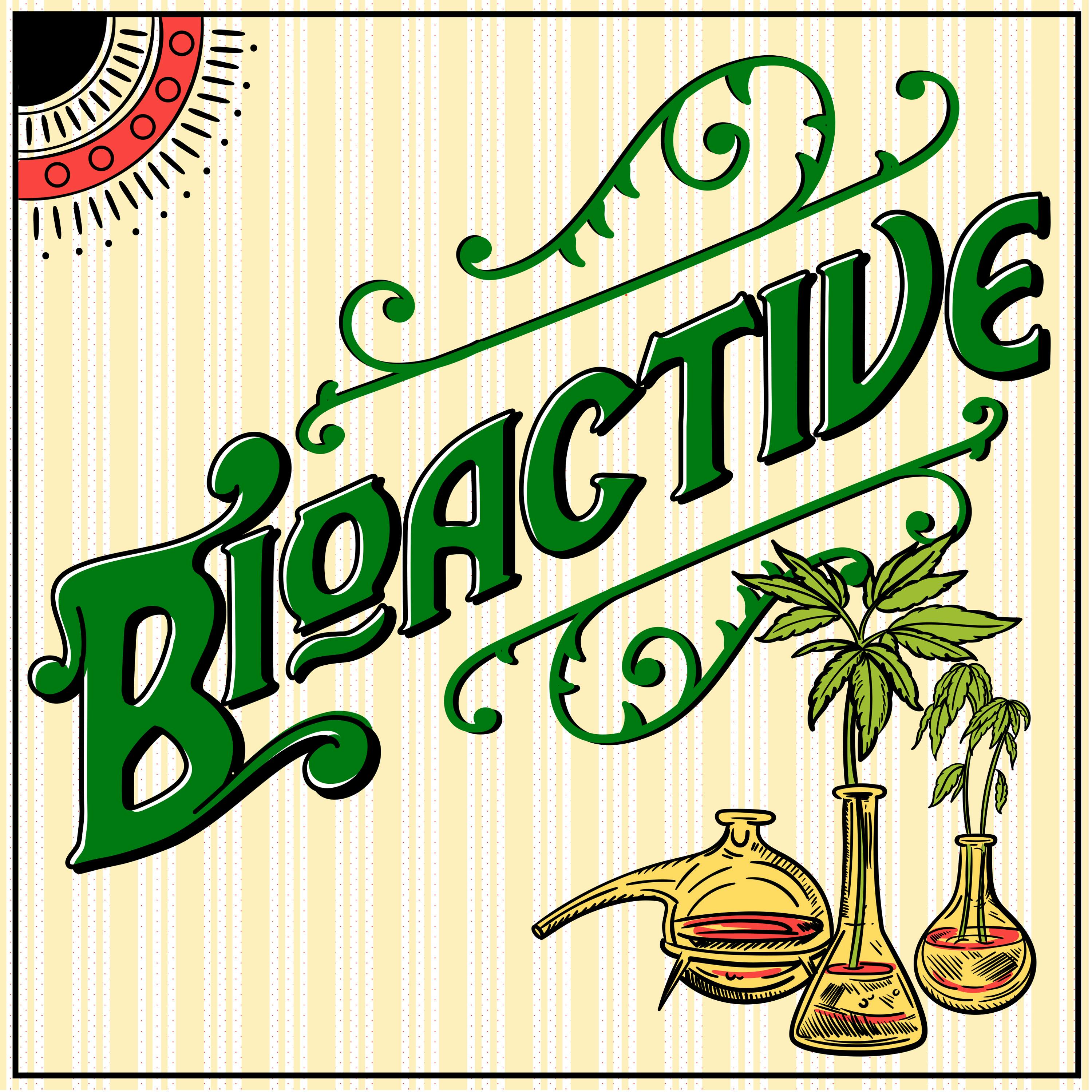
Bite Me The Show About Edibles
Helping cooks make great cannabis edibles at home.
Create your own tasty, healthy cannabis edibles and take control of your high life! Bite Me is a weekly show that helps home cooks make fun, safe and effective cannabis edibles. Listen as host Margaret walks you through an marijuana infused recipe that she has tested in her home kitchen or interviews with expert guests. New episodes every Thursday.
Bite Me The Show About Edibles
Lecithin 101: Make Your Edibles Great Again
Ever wondered how to make your homemade edibles smoother and more potent? Tune in to this episode of Bite Me as we explore the magic of lecithin, a naturally occurring emulsifier that can revolutionize your cannabis-infused oils and butters. You'll discover how lecithin binds fats and water, creating consistent textures and ensuring accurate dosing in your creations. We'll dive into the ideal ratios and methods to optimize your infusions, sharing personal insights and the latest research to help you elevate your culinary game.
Join us as we answer common questions about lecithin and its versatile applications in edibles. I'll share my own experiences and invite you to contribute yours, creating a collaborative learning space. Plus, get the scoop on the updated Bite Me Edibles journal, now available in two sizes, perfect for documenting your edibles journey. With practical tips and tricks, this episode is a treasure trove for any edibles enthusiast. Don’t miss out on the Marge Recommends page for trusted products and services that have my personal stamp of approval.
Show your love of Bite Me here. ;)
Visit the website for full show notes, free dosing calculator, recipes and more.
Hello friends, in this week's episode we're going to be talking about something that I've been asked about quite often, and that's using lecithin in your edibles. Welcome to Bite Me, the show about edibles, where I help you take control of your high life. I'm your host and certified ganger, margaret, and I love helping cooks make safe and effective edibles at home. I'm so glad you're here. Friends, welcome back. I am glad you're here and that we are going to be talking about lecithin, because this is something that I've been asked about many times over the years and I thought this would be a perfect opportunity to do a bit of a deep dive. So today we are going to be talking about why you should think about using lecithin in your edibles, and before we get into that, I just want to say, if you discovered the show for the first time, I would love to hear how you found out about Bite Me, the Show About Edibles. You can always shoot me a text right in your podcast app and if not, if you've been listening for a while, my heartfelt appreciation goes out to you. There may be numerous listeners out there who have asked this very question how and why should I use lecithin in my edibles and we're going to answer that question for you today, but before we do, I just want to mention that I have volume two of the Bite Me Edibles journal out. That's right because, as you know, you've been listening for a little bit.
Speaker 1:Last month I did an episode on how I am dropping the nickname Marge and I'm going with Margaret, and when I thought about it I realized, well, that means I need to change. I need to change the journal that I put out because it was riddled with the name Marge throughout, in some of the introductory pages, right on the cover, and we can't have that because I'm a brand new person. And of course I took the opportunity to also change the cover, which I'm really happy that I did. Actually, I like it a lot better, and I simplified the inside. The inner pages are essentially the same, except I made them a little less fussy. But now it's also available in two sizes. Yes, there is the regular eight and a half 11 size for those who prefer a larger format, and then I did a smaller. I'm calling it a pocket size, even though I don't think it would quite fit in a pair of like pants back pocket, unless you have a big butt, I guess, but it might fit in the back of mine I don't know Eating too many edibles perhaps. However, it does come in a smaller size as well, so you can find those on Amazon pretty much anywhere in the world. And if you do happen to pick one up, please consider leaving a rating and review for it, because one of the things I didn't consider when I started the process of making this journal is that it would not transfer over the reviews from the first journal that I had to the new one. And of course it doesn't, because that other journal is still currently live. You can still buy that. I'm probably. I tried to archive and it didn't seem to let me, so I'm not really sure what I'm going to do about that yet, but in any case, there's great ratings and reviews on the older version, the first version, of the journal, but not on the next one. So if you feel so compelled, if you're looking for a way to track your edibles experience whether you're making them yourselves or making them for yourself which is you probably are because you're listening to this podcast or whether you're buying them and trying to dial in dose or just fine tune what works best for you, you can use this journal in both contexts. So that's my little PSA of the day. If you're interested, go check it out. I'll put a link in the show notes so you can find it easily.
Speaker 1:Let's dig in to lecithin. I'm going to be completely honest. Lecithin is not something that I actually use too often myself. Even though I have lecithin, I have used it before in certain contexts. But after doing a little bit of research for this episode, I realized I probably should be using it more often and considering that it's not an expensive ingredient to purchase, it seems like it would be a no-brainer. But let's get into the reasons why you should consider using lecithin in your edibles. And, of course, you're taking control of your high life. If there's any reason why you don't feel like lecithin is right for you, then you get to do whatever the hell you want.
Speaker 1:Lecithin, it's a naturally occurring fatty substance found in plant and animal tissues, commonly sourced from soy, sunflower or egg yolks, and it's used in the food industry as an emulsifier, so it helps bind fats and water together, ensuring smooth textures in foods like chocolate, sauces and, of course, our beloved edibles. Reason number one why you might want to consider using lecithin in your edibles is that it is the emulsifier. So this is the major reason that people like to use lecithin. As you probably know because you've been baking for a little bit, cannabis oils and butter don't naturally mix well with water-based ingredients in many recipes, so the lecithin acts as a bridge between these two ingredients. We all know oil and water don't mix, so lecithin allows for an even more homogenous mixture and this can make your edibles more consistent in texture and potency. And that's important, especially if you're gifting your edibles, because we've all had that experience where you have some edibles where one, if you're making, say, a batch of cookies, where one cookie might have a stronger potency than another. We want to avoid that as much as possible. So the emulsifier can really help bind these ingredients together so that you have more consistency.
Speaker 1:And they are also fantastic for making cannabis gummies, and this is because it is emulsifier. It can work to combine oil and water together so that the cannabis oils don't separate from the rest of the ingredients in the batch of gummy bears, and I've actually had this happen to me firsthand. The instances where I have used lecithin in my own personal cooking edibles making life is when I've been making gummies, because sometimes, when you want to use an infusion like an oil to make gummies, I have had the experience where the cannabis oil almost forms a layer. It doesn't emulsify, if you will, does it mix in properly with the gummy mix, and I've had ones that have turned out where they end up with as a layer on the bottom of the mold or on the top of the mold or something mold of that I was using, and so obviously it doesn't also look as nice if you haven't used an emulsifier, and this is some reason another reason why some people like to use concentrates in some of their gummies, because they do seem to work better in incorporating. But if you're going to use an oil, an emulsifier is a must when you're making things like candies and gummies, and because it prevents the separation of water and fats.
Speaker 1:Lecithin can also extend the shelf life of your edibles as well. Now, typically I don't find this to be much of an issue. If I have edibles that are going to be kicking around for a little bit longer, what I tend to like to do is freeze them so that I can extend the shelf life without having to worry about something going bad on me, and also I tend to be eating them a lot or gifting them, so that also means that they don't typically last that long anyway. But if you're going to have some edibles that you think may be kicking around for a little bit, lecithin might be a good way to help preserve or extend the shelf life of your edibles. Number three enhancing potency with lecithin.
Speaker 1:It has been suggested that the use of lecithin can improve the absorption of the cannabinoids and that lecithin can make it easier for the body to process and absorb the active compounds, potentially increasing the potency and efficiency of the edibles. But this doesn't necessarily mean that it increases the THC content, but rather helps to ensure that more of it is absorbed, meaning that there's improved bioavailability and less is going to waste during digestion. Beyond the emulsifying properties of lecithin, it may help improve the metabolism of edibles so that they potentially kick in faster. The emulsifying properties of lecithin may help the cannabinoids break down into tiny globs of fat and bile acids known as micelles if I've said that correctly I am no scientist which allows the cannabinoid molecules to be separated from each other and encapsulated with water molecules, and this makes them more susceptible to be absorbed directly into your lymphatic system before the first past metabolism of the liver and therefore lots of people who like edibles may attest that it can increase the potency just by making it more bioavailable. Remember, it doesn't actually increase the THC, it just means that more of it is going to be absorbed, so it can help with the absorption of other it can help with the absorption. So some of this stuff has been a bit anecdotal, but it's worth an experiment. It's worth testing to see how you find it and again, that's where your edibles journey or journal might also help with this to see if you notice a difference in the effects when you're using lecithin versus when you're not.
Speaker 1:Number four lecithin may improve the texture of your edibles because lecithin plays a key role in texture. So when it's used in cannabis infused oils, butters or concentrates, it ensures smoother, creamier textures in the finished product, like brownies and cookies or gummies. And this can be especially important for products like chocolate, where you want a silky consistency, because we just have this expectation of chocolate and it makes it better visually and because it prevents separation. It makes sure that the fat and water components in the edibles that you're making won't split over time either, so it leads to a more stable and longer lasting and attractive product. There are, of course, different types of lecithin, so number five types of I don't know if that's really a number five. So the different types of lecithin, um, there are.
Speaker 1:The most common that you're probably you've probably come across in your local grocery store is your soy lecithin and your sunflower lecithin. Soy lecithin is common, it's affordable and you can get it in both powdered and liquid forms. There's also, as I mentioned, the sunflower lecithin, and if you're wanting to avoid soy for a variety of reasons, then some might consider it more natural and organic. I tend to use sunflower lecithin and whenever I've used lecithin I used the liquid version, which has a consistency like molasses. The liquid may be easier to mix into batters and oils, while the powdered lecithin you might find easier to measure out in store. So they both have pros and cons. I've personally just always leaned towards the liquid myself, and I actually haven't tried the powdered yet, but I might actually go out and start experimenting with it and adding it into more things because, as I am doing this episode, I'm convinced that I should be using lecithin more often in my own edibles.
Speaker 1:When and how to use lecithin in your edibles you can use lecithin can be added when you're making your cannabis infusion, your oil and your butter, though it can also be added to the final recipe, so you can do it both ways. I have personally never added it to the infusion process. Well, have I? I might have, because I think when I had my magical butter machine, when I first got it, it suggested using lecithin and putting it in with your oils in butters. The only instance you might not want to do is when you're doing like a water bath. Then we'll get into that in a minute. But as far as the oil goes, you I guess I have done it before, but it's been a long time because I was just like I didn't really seem to notice a difference, probably because I wasn't taking notes and writing things down. This would have been years ago. I have definitely added it to a final recipe, as I mentioned the gummies, because I find that it just vastly improves the end result and you're not going to have this weird layer of oil on the top when I've used like an oil to make infused gummies and it's a game changer For most recipes.
Speaker 1:You don't need much. We're talking. A tablespoon to a tablespoon of lecithin is enough, depending on the quantity of the butter or oil being infused. So typically, a ratio of, let's say, one teaspoon to one tablespoon of sunflower lecithin to one cup of coconut oil is considered enough. And if you're using a crock pot or slow cooker or sauce pan, you simply add it in with the oil and your decarbed cannabis when you're, when you're prepping your infusion, and that's it. It's, it's mixed in. Just make sure you're going to. Well, you don't have to make sure of anything, you just add it when you, when you're doing your infusion.
Speaker 1:So if you're doing, you know, a couple of cups of of coconut oil with your decarbed weed, you might want to consider adding two teaspoons to two tablespoons of lecithin. And, you know, the less you can get away with, the better, I would imagine, because that just means you will, it'll last longer for you, you won't have to buy it as often and this stuff is not expensive to buy either. So we're not talking some fancy ingredient that's going to cost you a lot of money. It's, it's relatively cheap, at least the last time I bought it. Maybe it's been a minute, I don't, because I haven't been using it a lot. Perhaps prices have skyrocketed since the last I purchased it, but I suspect it's still not that bad.
Speaker 1:Adding lecithin to canna oil during the infusion process can help it blend more seamlessly into whichever recipe you'll use it in. So, as an example, if you're making a pan of weed brownies, it can help the other ingredients, like cocoa and sugar, bind with the cannabis oil and potentially distribute more evenly throughout the mix. And we kind of touched on this already. This can help with dosing, because it's just going to ensure that you have a more homogenous mix of your cannabis in with the rest of the ingredients, so that you're going to have more accurate dosing across a batch. So just also the one of the big things with that too is just make sure you're cutting your weed brownies all about the approximate same size and you should be good to go. And you can add lecithin to can of butter. But if you're doing an infusion where you're doing the butter like a water bath, this is when you don't want to add your lecithin because you don't want the water in this instance to bind with the fat of the butter, because you want to toss that water. So that's one of those instances where you don't want to include the lecithin, but otherwise you can add it to your oils and butters when you're doing the infusion process and end up with an infusion that will bind with ingredients better, no matter what it is that you're making.
Speaker 1:There are alternatives to lecithin, I think you know. You might have tapioca starch or agar. I think lecithin is going to be a much simpler and more proven way to get that emulsification and I have zero experience with that other stuff. I've played around a little bit with agar as I worked for quite a while in my daughter's vegan restaurant, but for most edible makers, the increased bioavailability and improved texture is the way to go.
Speaker 1:With your good old-fashioned lecithin Finally, you just have to watch, I guess that you don your good old fashioned lecithin Finally, you just have to watch, I guess, that you don't add too much lecithin. Because if you do add too much, this is why I mentioned earlier, like you know, when they're suggesting one teaspoon to a tablespoon per cup of your fat, why you want to use as little as possible to get the results that you want the emulsification is because you don't want to affect the taste or texture of whatever your final product is going to be. So just bear that in mind and if you can do a little bit less. If it was suggesting a teaspoon to a tablespoon, I would probably do two teaspoons per cup and see how that works out. Or maybe just try the one teaspoon and make notes of it, because you don't want to affect the final outcome by having a strange taste because you used lecithin. So, essentially, lecithin is a natural emulsifier that's going to bind the fat and water together to make your edibles smoother and more consistent in texture. It will enhance the bioavailability of the cannabinoids, potentially so that your body absorbs more of the THC or the CBD in your creations, and it's also going to improve the texture of your edibles so that you have less separation and resulting in more stable and appealing product.
Speaker 1:So, for all those reasons, I think we should all be trying to add a little bit more lecithin in our lives, in our edibles making, and that's something I'm going to be playing with.
Speaker 1:I have a bottle of liquid semphore lecithin on my shelf and I think I need to be using it more often, based on this research. But there have been many of you that have asked me about lecithin over the last while and I thought it was time to address this particular question and let me know what you think, or how you use lecithin in your edibles, if you're doing something that you find works particularly well, and I can share them with the listeners of Bite Me. So I think that's it for this week, my friends, if you have an edibles lover in your life that also likes to experiment making edibles, then why not consider sharing this episode with them? They might learn right alongside you, and I Consider checking out the products and services on the Marge Recommends page. Those are products and services that I use all the time in my own life and I don't recommend things that I don't have any experience with personally. And with that, my friends, I'm your host, margarite, and until next time, stay high.
Podcasts we love
Check out these other fine podcasts recommended by us, not an algorithm.

The Cannabis Potcast
Gary Johnston
High Ladies
High Ladies Podcast
The Smoking Spot
The Smoking Spot
Great Moments in Weed History
David Bienenstock
Dope History
Tad Hussey, Chad Westport
The Wake + Bake Podcast
Corinne Tobias and Andrea Meharg
How to Do the Pot
Ellen Scanlon
The Weed Witch
Pipe Dreams by The Weed Witch
High on Home Grown, The Cannabis Podcast
Percys Grow Room
Exploring Cannabis & Exercise
Whitney
BIOACTIVE
Riley D. Kirk, Ph.D.
